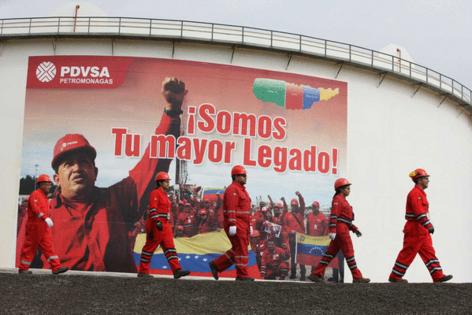Trump quietly renews Chevron's license in Venezuela, marking shift in US policy
Published in Political News
In a marked shift in U.S. policy toward Venezuela, the Trump administration has quietly approved a new license allowing oil giant Chevron to restart its operations in the South American nation, according to sources with direct knowledge of the negotiations.
The decision this week represents a departure from earlier hard-line measures and suggests a recalibration aimed at balancing energy interests with ongoing foreign policy challenges involving the Nicolás Maduro regime.
The new arrangement, described by sources as a “specific license” rather than a general one, allows Chevron to resume more regular activity with Venezuela’s state oil company, PDVSA. Under the framework, Chevron will reportedly pay the Maduro regime in barrels of oil rather than in cash — a shift that may give Caracas some latitude to commercialize its resources amid continued international sanctions.
Sources say that one significant distinction between a specific license and a general one is that the former can be issued privately while the latter is granted is such a way that it is there for the public to see.
“They made it a specific license instead of a general license like the last one,” said a person briefed on the talks, speaking on condition of anonymity. “Negotiations were held in Caracas yesterday negotiating some changes to the contract with PDVSA.”
Asked about the new license, the State Department said it was only issued for Chevron’s maintenance purposes and to create the conditions for the regime to repay the huge debt that it owes the Texas-based oil company, but that it would not aim to provide Maduro any type of financial relief.
“While we cannot speak to any specific licenses, the U.S. government will not allow the Maduro regime to profit from the sale of oil,” the State Department told the Miami Herald in an email.
Experts, however, said it was hard to see how the Caracas regime would not benefit financially under the new arrangement.
“This is hard to understand,” said Juan Fernández, a former PDVSA executive director of planning. “If they are saying that they are not going to give out cash but that they are going to pay them in [petroleum] this obviously will benefit Maduro, because once they receive the oil, they will turn around and sell it.”
Venezuela’s debt to Chevron had been estimated in around $3 billion before the amount was reduced following the Biden administration’s decision to grant the Texan oil company a license to operate in the country.
That license was revoked by the Trump administration earlier this year in a move that took effect in May and that significantly disrupted the finances of the socialist regime. Chevron was responsible for roughly a quarter of Venezuela’s oil output, which earlier this year stood around 900,000 barrels per day.
Other international energy companies—Spain’s Repsol, Italy’s Eni, France’s Maurel & Prom, and India’s Reliance Industries—were also affected by the U.S. restrictions. Collectively, those firms accounted for another 230,000 barrels per day of production.
Chevron and the other companies have played a central role in Venezuela’s efforts to recover from the near-collapse of its oil industry, which once produced 3.2 million barrels per day before declining to just 400,000 barrels per day in 2020. Venezuela has the largest proven oil reserves in the world, just ahead of Saudi Arabia.
Estimates from industry analysts prior to the license suspensions suggested that foreign companies were providing the Maduro government with an average of $700 million to $800 million per month.
While official U.S. policy continues to call for democratic reforms in Venezuela, the quiet reauthorization of Chevron’s operations indicates a more pragmatic approach in dealings with Caracas. Sources say U.S. officials have engaged in direct negotiations with high-ranking Venezuelan figures, including National Assembly President Jorge Rodríguez.
Back channel talks reportedly remain active, involving U.S. diplomats based in Bogotá and senior Venezuelan officials. These conversations have included proposals to restore diplomatic presence by reopening embassies in Washington and Caracas, although no official announcements have been made.
The policy shift also reflects evolving dynamics within the Trump administration. Secretary of State Marco Rubio, a long-time critic of Maduro, is now seen as playing a central role in shaping the administration’s Venezuela strategy, while former special envoy Richard Grenell appears to have taken a back seat.
“The State Department or National Security Council is calling the shots now,” said the source, who asked to remain anonymous in order to speak freely.
While Rubio has historically supported a tough stance against authoritarian governments in the region, his involvement in the Chevron licensing process suggests that broader U.S. strategic interests—particularly energy security—are now taking precedence.
Industry observers note that despite efforts to keep the new license quiet, public disclosure may be inevitable as Chevron’s oil begins to reenter Gulf Coast refineries.
“You can’t keep it under wraps too long,” the source said. “Eventually, the oil is going to look for passage through the Gulf to refineries in the U.S.”
Chevron has operated in Venezuela for nearly a century and was the last major American energy firm to maintain a presence in the country amid sweeping sanctions. Its continued presence has long served as an indicator of U.S. policy direction.
While the license renewal may open the door for other companies to explore similar arrangements, it also raises questions among Venezuelan opposition leaders and human rights groups concerned that any form of normalization with Maduro could weaken efforts to restore democratic governance.
For now, the resumption of Chevron’s operations marks a potentially significant turning point in U.S.-Venezuela relations — one that could reshape diplomatic, economic and political dynamics in the region.
©2025 Miami Herald. Visit at miamiherald.com. Distributed by Tribune Content Agency, LLC.

























































Comments